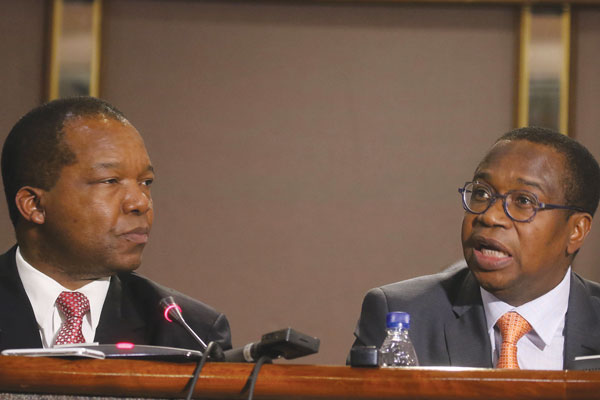
Government has been challenged to draft sound industrial and agricultural policies that will steer the country from the current economic woes, characterised by a severe liquidity crunch and foreign currency shortages.
TAFADZWA MUTACHA/XOLISANI NCUBE
Speaking at an Alpha Media Holdings (AMH) Conversations, which was held in conjunction with the Zimbabwe Council of Churches on Wednesday, economist Gift Mugano said as long as the country does not have sound industrial and agricultural policies, efforts by monetary authorities to address the current challenges would be futile.
“From the monetary policy, I missed the key factors that could change our economy. I missed that thing which deals with the supply side of our economy,” Mugano said.
“Until we deal with such things, we are not solving anything. We need to have an industrial policy to guide and promote production. We need to have an agriculture policy or else we are dead. The last agricultural policy was done in 1992 or somewhere there.”
He added: “I expect to see the Minister of Industry (and Commerce) coming up with policies to deal with that. It will be very useful than us focusing on the monetary or fiscal policies.”
The AMH Conversations brought together business leaders, clerics as well as labour to unpack how the country could move forward and grow its economy, given the myriad of challenges it was facing.
Zimbabwe Lawyers for Human Rights executive director Rosemary Hanzi said President Emmerson Mnangagwa’s government needed to do more to ensure existence of the rule of law as well as respect of human rights if current efforts to rebrand the country are to bear fruit.
- Chamisa under fire over US$120K donation
- Mavhunga puts DeMbare into Chibuku quarterfinals
- Pension funds bet on Cabora Bassa oilfields
- Councils defy govt fire tender directive
Keep Reading
“A lot needs to be done; the issue of property rights, protection of freedom of expression as well as the human rights issues in general. As a country, we need to close the grey areas and make sure we walk the talk,” she said.
Meanwhile, speaking at another AMH Conversations platform yesterday, Tinashe Kaduwo, an economist at Econometer Global Capital said government lacked a nationally shared long-term economic plan, with very little consultation being done with business and the public in addressing problems being faced in the economy.
“We are at a stage that requires real policy and real intervention from the government. The monetary policy seems to me that it was a bit rushed, together with the fiscal measures,” Kaduwo said.
“There is not much engagement with the industry and the citizens as well. The Reserve Bank of Zimbabwe governor and the Minister of Finance did not consult business experts as well as the community.”
He said there was need for a well-crafted monetary policy, which is backed by a long term macro-economic policy.
“It seems there is no certainty on what we really want to achieve,” Kaduwo said.
“Government is lacking in public engagement in terms of policy crafting. We expected a bit of engagement by the government with industry experts and then they can disseminate to the people. To me, it seems like we are having policy experiments, which does not go well with confidence and where we want to go as nation.”
He said Finance minister Mthuli Ncube was supposed to announce a proper macro-economic policy before introduction of the new monetary measures.
“The starting point for the minister was to first give us a proper economic policy of where we want to go as a nation with clearly set objectives and targets and then come up with these short term stabilisation measures,” Kaduwo said.
Kaduwo drew parallels on how Zambia came up with a well-crafted 2030 vision in 2006 with successive leaders and governments coming in and working towards the goal that had been created by the late former Zambian President Levy Mwanawasa, which is lacking here in Zimbabwe.
“Right now, the economic policy that we have is ZimAsset, whose life has elapsed. Yes, we have vision 2030 as pronounced by President (Emmerson) Mnangagwa, but I do not see it as a shared vision and it is not crafted down,” he said.
Formerv Industry minister and Alliance for the People’s Agenda president Nkosana Moyo said government priorities were misplaced, resulting in bad expenditure patterns.
Confederation of Zimbabwe Retailers president Denford Mutashu said there was need for industry to be recapitalised, with government supporting the productive sector to revive the economy.







